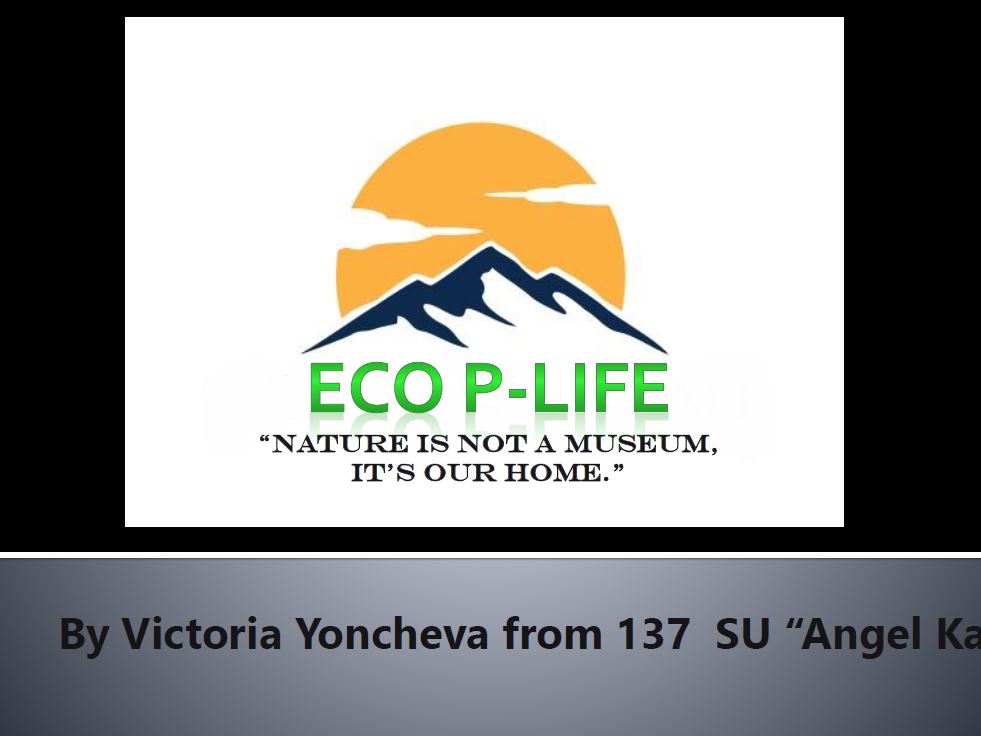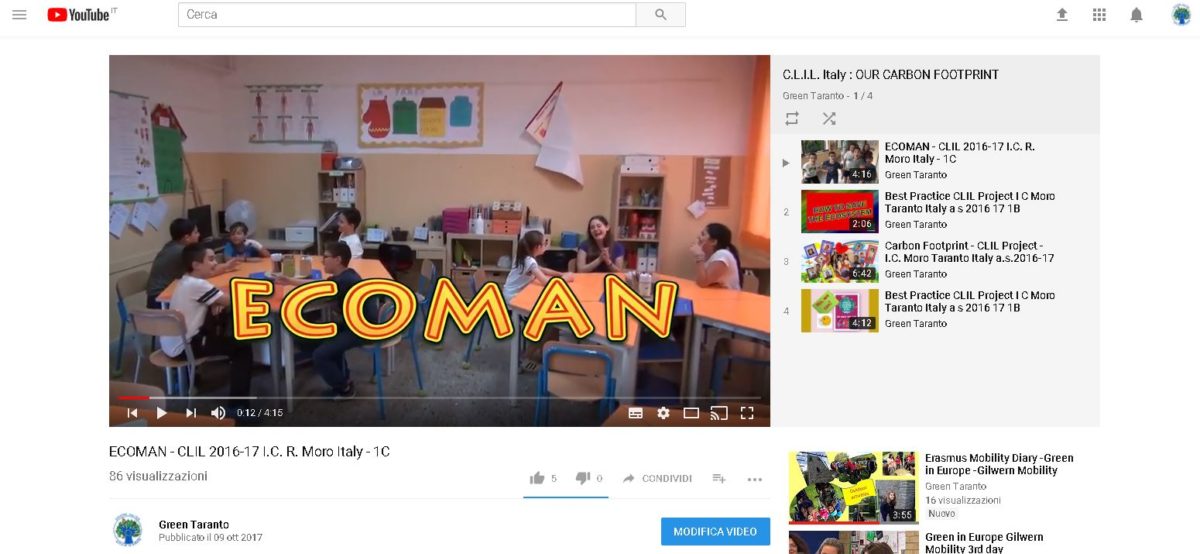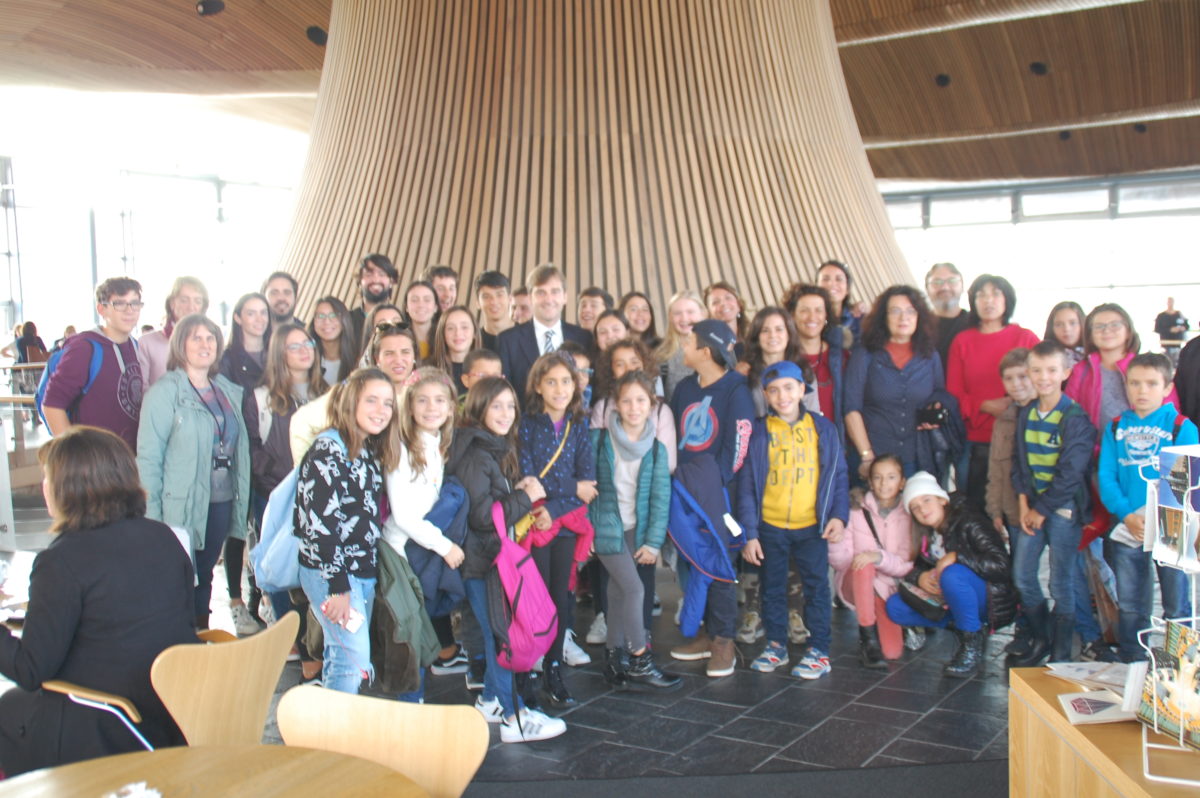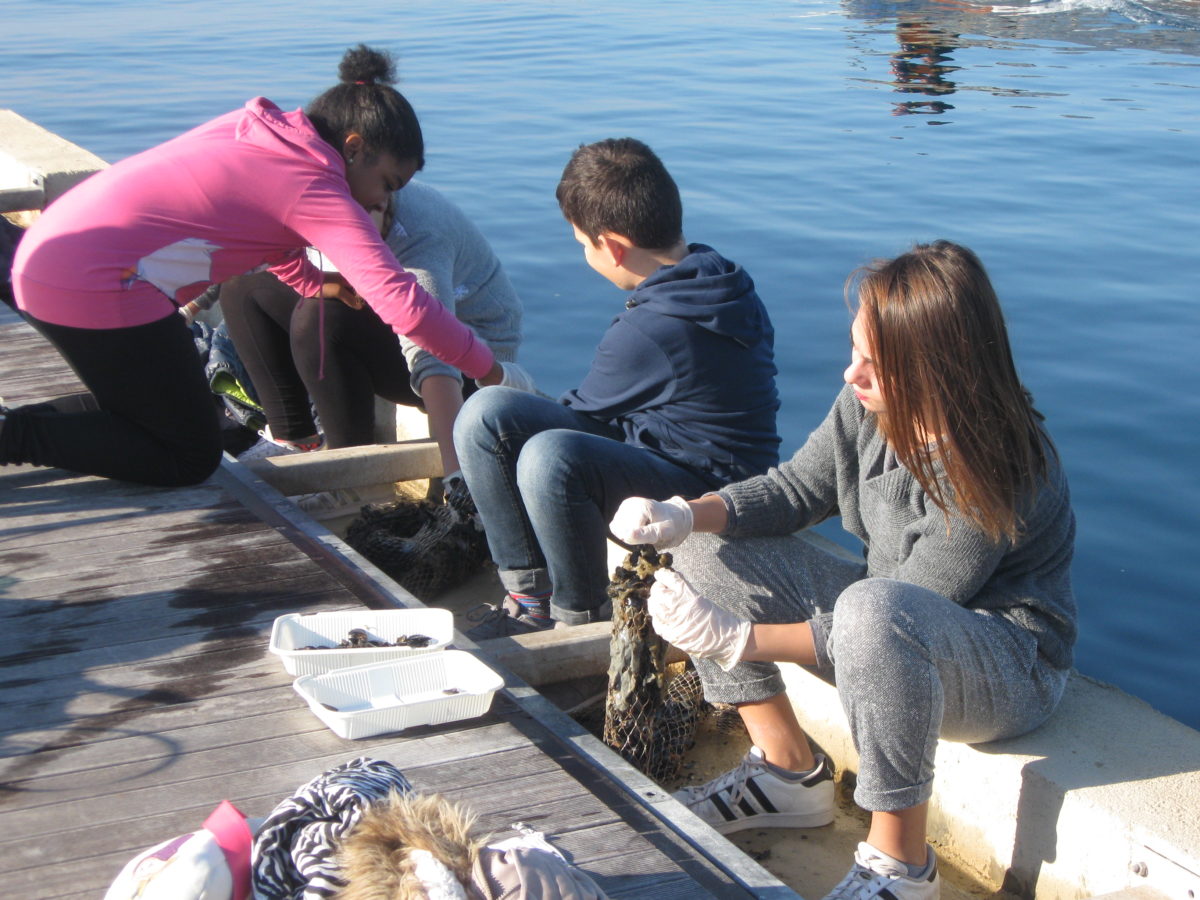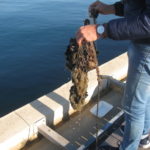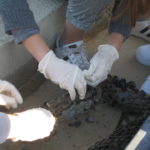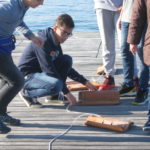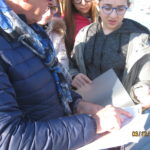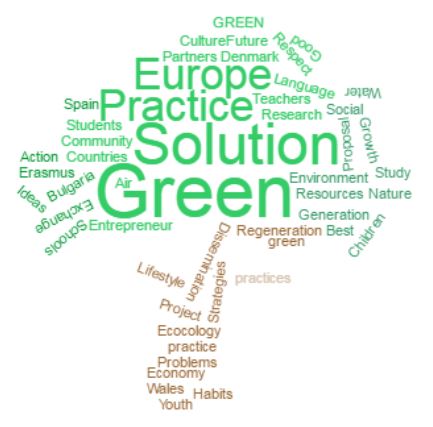Tag: europe
ECO P LIFE – BULGARIA – In the “Best Business Plan” competition
BIO FRESH Cosmetic – BULGARIA – In the “Best Business Plan” competition
C.L.I.L. activities 2016-2017 – “OUR CARBON FOOTPRINT”
During the last school year, Classes 1^B and 1^C of junior High school of IC “R. Moro”, Taranto – Italy, developed a C.l.I.L. activity about: “Our carbon foot print”.
Following their previous knowledge about the water cycle and some ecological issues, they were guided by their teachers to carry out a general brainstorming concerning the environment and other related topics; they learned about ecosystems: atmosphere, soil, water and living beings, they studied the carbon cycle and found out that carbon is present in the natural environment.
Step by step, they built up their vocabulary, they worked in pairs and in small groups and had great time too. Learning by doing they created posters and slogans and it was really amusing for them;
They tested and graded their carbon footprint and understood how fast we consume resources and generate waste.
They debated about Global warming, pollution, recycling, the ozone layer and deforestation; they focused on What to do to reduce our carbon footprint and Why, filled in charts with missing information and learnt how they can make a difference in the world to preserve our wonderful natural beauties.
They children used Google Classroom app to keep in touch with their teachers and their classmates and share their activities with them.
Now they are aware that the environmental implications are in our everyday activities It would be a big mistake not doing anything to help our planet, they promised they won’t give up and they hope they can change our world, but above all they are very proud of learning all the above improving their English knowledge.
Erasmus Mobility Diary – Gilwern Mobility
At the end of the mobility in Wales, the students of Renato Moro Primary School of Taranto have made short multimedia diaries. Below you will find one of them. Have a Good vision!
STUDENTS ON THE WAY TO GET A GREEN LIFESTYLE I.C.”RENATO MORO”-TARANTO
Here is the presentation of the activities of the project done by the students of the Primary school to discover the meaning of a “Green lifestyle”.
ACTIVE SCIENCE – Outside and inside the sea – Project
Best practices related to the theme of sustainability that are related to business ideas, productive activities that could create a value that is not only economic.
Describe the BEST PRACTICE
Proposer Country : Italy

To which subject of the Sustainibility does it refer?
8 – Decent Work and Economic Growth
14 – Life Below Water
17 – Partnerships for the Goals
Who does it practise ?
I.C. Renato Moro (School); “Co.MIR” – Southern Cooperative Surveys and Researches, “Ittica Jonica”- Cooperative Society, Department of Biology of the”A. Moro” University of Bari, Networked with the IISS- High School of Applied Sciences – Industrial Technician with sections of Computer Science and Telecommunication, Chemistry, Materials and Biotechnology “Majorana” Martina Franca.
Where? (If it belongs to B type, please indicate the geographic place)
In the Apulia Region, in Southern Italy, in the sea of Taranto.
When?
The activity took place during the academic year 2016-2017
Why do you think that this best practice can be exported?
This activity is exportable as Best Practice because it is an important partnership between school, university and workers’ consortiums.
Describe the activity
The project was intended to expose the students to science and its research method throughout a task oriented and guided practice teaching approach. The on-site visits on the coast line, for inspection, detection and sample survey and collection, aimed to learn more about the oyster reproductive cycle (Ostrea Edulis).
Considering the local oyster farming cultural and historical roots, the oyster spat collection, the growing cycle, the organisms set aside, the morphometric evaluations and the environmental assessment were the main activities developed on the matter.
MEDIA
WEBSITE
Thanks to the Winner of “A Common Logo Contest”- The Erasmus+ G.R.E.E.N in Europe project has its official logo
Finally we know the winner’s name of “A Common Logo Contest”.
We thank all participants for bringing in their creativeness and for designing several interesting logos. But only one of them could be voted as the most representative logo of The Erasmus+ G.R.E.E.N in Europe project.
All 6-14 aged students of all partner schools (Italian, Bulgarian, Basque and Welsh) could take part to the contest. They had to design a logo representing all countries involved in the project and the green and eco-friendly development idea for the environmental safeguard of all countries.
The logo had to show, at least, a symbol representing the countries involved and to make reference to the Erasmus+ project. It had to be creative and colorful and focus on the positive aspects of each country. Furthermore, the participants could refer to the following tags to get inspired: green, Europe, environment, nature, research, action, eco-friendly development.
Here is the winning logo following the vote on the project official Facebook page: https://www.facebook.com/greenineurope/

The logo was designed by Claudia Bulli a student of the Italian I. C. “Renato Moro” junior high school, coordinator of the project.
Special thanks are due to all people who voted on the logo album or only visited our Facebook page: https://www.facebook.com/media/set/?set=a.611017982420264.1073741832.568501750005221&type=1&l=5b3ac6f2b0
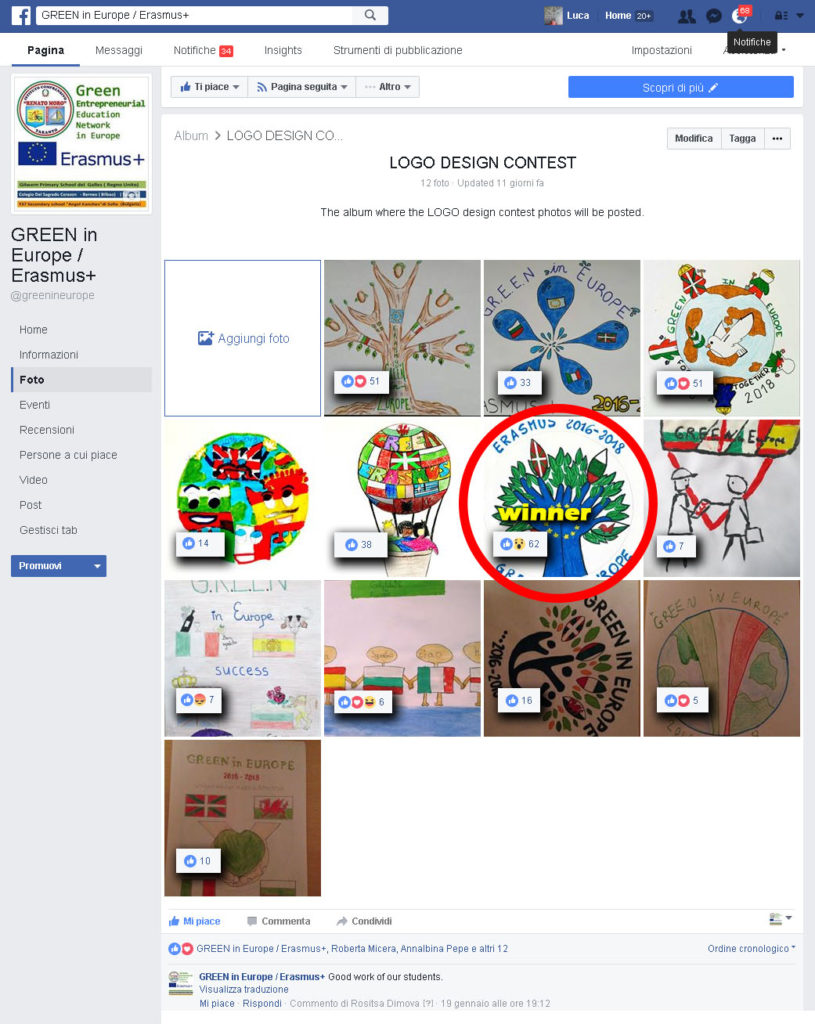
We can describe it as a great success if we consider the following figures: more than one thousand proposed logos, more than three thousand hits and 300 likes
Erasmus+ Team working
I.C. “R. Moro” – Taranto
The Project – G.R.E.E.N. in EUROPE
Green Entrepreneurial Education Network in Europe
CODICE PROGETTO 016-1-IT02-KA219-024333
The project G.R.E.E.N. in EUROPE -Green Entrepreneurial Education Network in Europe –
is based on two pillars: the professional training of teachers and innovation in the field of education with the introduction of entrepreneurial education from primary school through content that is part of the value and culture of the partner schools: environmental sustainability and active citizenship education. It also includes certifications for the skills acquired during the learning pathway both for teachers and for students.
The project is about exchanging the best practices to implement better Green Life Styles in fact it aims to create a network of good practices to deal with those environmental issues that are threatening our own local areas (air, water and soil pollution, garbage disposal, etc), but also with unhealthy behavior (eating junk food, sedentariness, use of chemical cleaning products, etc.).
As a first step in the development of the project, the students should acquire knowledge and be inspired by green good practices, already successfully implemented in each partner country. In the second year of the project activities, they should plan how “to import”, to replicate, that “green” idea/solution in their own local area (“green” products, technologies, sustainable alternatives etc.). In the end, 6-11year old students should be able to plan a “green” advertising campaign and 12-15 year old students should be able to draw up a simple “green” Business Plan to be submitted to the local organizations and institutions to support and “to sell” the chosen green idea.
The project and the study visits as well will be focused on experiential, environmental, and entrepreneurial learning expanding the students’ sense of global citizenship and environmental responsibility and fostering entrepreneurial, technological education.
The objectives of the project are in step with the common political priorities and transversal priorities established by the E.C. in the field of education and training (ET 2020) whose essential purpose is supporting the improvement of education systems, mutual learning, exchange of good practices and professional development of teachers as well.
All the educational activities expected in our project as:
- providing training for teachers;
- considering and appreciating the best practices of our partners’ countries in the field of sustainable lifestyles,
- finding a way to ensure the exchange of information on best practices in this field (using English, modern technologies);
- visiting our partners’ countries with surveys and on-site workshops;
- mentoring young students to produce business ideas in order to “export” and / or “to import” the healthy /eco-friendly lifestyle which is efficacious and innovative in our partner’s country;
- steering the students, future citizens of Europe, towards thinking and planning a Green Economy that can be on the basis of future production and consumption systems based on the sustainable use of resources and reduction of negative impacts on the environment, are widely in line not only with the Strategic Objectives set by the E.U. for 2020 but also with the strategic priorities redefined in COM (2015) 408 final del 26/08/2015 for European cooperation in education and training:
- Strengthening the development of transversal skills and key competences, in line with the Reference Framework on Key Competences for lifelong learning, in particular digital, entrepreneurship and linguistic competences;
- Promoting awareness and education in the environmental field developing skills reflecting growing sectors, such as the green economy;
- Acquiring and mainstreaming innovative and active pedagogies such as inter-disciplinary teaching and collaborative methods, to enhance the development of relevant and high-level skills and competences;
- Supporting continuing professional development of teachers especially to deal with work based learning, digital competences and innovative pedagogies, including through EU tools such as eTwinning;
- Supporting the mobility of students, teachers and the development of strategic partnerships and joint courses by increasing internationalisation of education.
Dissemination is a very important phase in the project focused on two main aspects of it:
- knowledge and dissemination processes, habits or products belonging to the sphere of Green lifestyles;
- education of the students from primary school to the culture of entrepreneurship and business.
The outcomes of this transnational cooperation will be widely disseminated among all the relevant stakeholders through events, fairs, exhibitions and all the path and activities will be published on T.E.S. and Junior Achievement sites that collect all the good practices related to teaching entrepreneurial skills and shared with E-twinning community.



